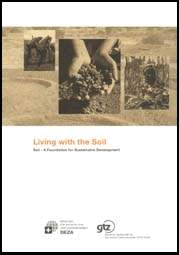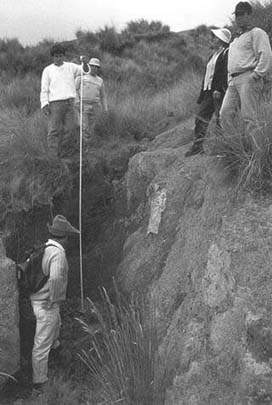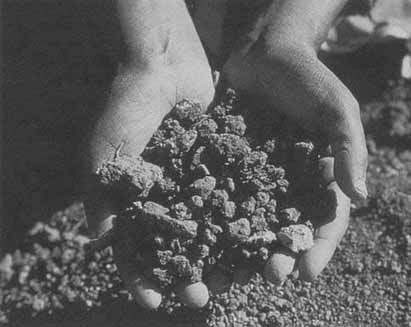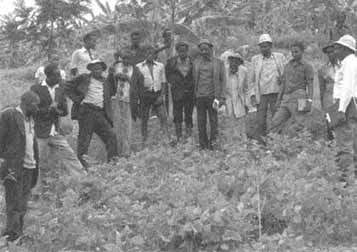
The Ground is Disappearing Beneath our Feet[edit | edit source]
In development cooperation projects, soil degradation and sustainable soil management are almost always key themes. Priority is attached to immediately evident benefits such as improved nutrition situation, increased household income, training, promotion of women, innovative organisational forms, etc.. Having said that, many of these key aims of development cooperation presuppose that the soils remain suitable for sustainable agriculture, whilst their productivity is maintained and increased.
|
Some major disasters are caused by soil degradation: · A few decades ago, wind erosion and sandstorms forced hundreds of thousands of families to migrate from the Midwestern USA, then known as the Â"dust bowlÂ". · Over the last 20 years, overgrazing and over-exploitation in the West African Sahel region have allowed the desert to advance by 200 km, which has been a contributory factor in famines and mass death among agricultural animals. · In the ancient cultures of Ethiopia, centuries of inappropriate management of soil, water and vegetation left those resources in acute jeopardy. In conjunction with extreme climatic phases, this ultimately fostered the famines of the seventies and eighties. |
Figure
Soil undergoes change as a result of human economic activity such as cropping, grazing or forest harvesting. These changes are usually barely visible at first. The first clear signs are diminishing yields, and an increased susceptibility of crops to dryness. Once erosion rills and gullies appear, the soil is already badly damaged and can only be repaired with great difficulty.
Figure
Since many processes of soil degradation are slow and creeping, it is important that they be recognised early on. A number of indicators help serve this purpose. For instance, certain plants become discoloured in response to nutrient deficiency, or the number of earthworms declines. Experienced farmers recognise these signs.
This presents development cooperation with an opportunity. Because early recognition creates scope for countermeasures before the fertility of the soil, and thus the natural resource base on which the population vitally depend, suffer irreparable damage. It is possible to protect soils effectively, before dried-up wells and dead livestock force the rural population to migrate. The key to the problem is: think preventively and thus avoid damage.
Figure
|
Paraguay: Proyecto Conservaci�n de Suelos On tropical and subtropical soils, mechanical soil tillage such as ploughing is incompatible with the ideal of sustainable agriculture. Direct sowing, i.e. zero tillage, presents an alternative. This method reduces production costs, increases yields sustainably, and thus directly improves farm income. This approach is being put into practice in Paraguay. There, fields in the east of the country account for around 95% of agricultural production by value. The last forests are falling prey to massive clearance, designed to create new cropland. But the original soil fertility is quickly lost when the soils are exposed to the rain and the sun after ploughing. This is prevented by direct sowing, which involves sowing the seed directly into the ground, through a protective mulch layer. This method fosters adherence to a certain crop rotation regime producing sufficient biomass. At the same time, the mulch layer and green manuring suppress weed growth. Larger farms still apply herbicides, although on a much smaller scale, and small farms rely entirely on biological measures. Within 5 years, between 1992 and 1997, the area in the east of Paraguay under direct sowing management rose from 20,000 to 480,000 ha. GTZ made an important contribution to this... |


